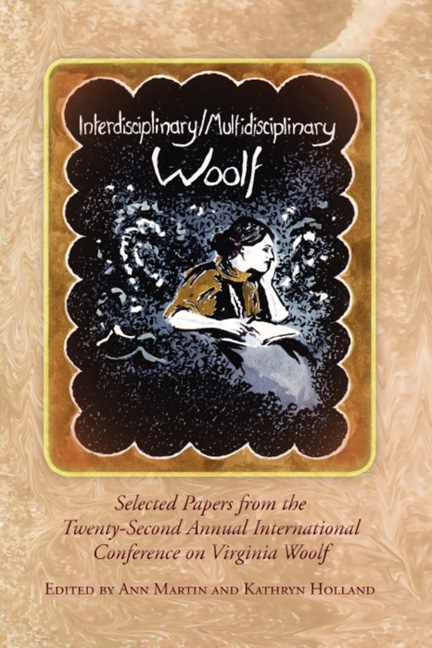Book contents
- Frontmatter
- Contents
- Introduction to Interdisciplinary/Multidisciplinary Woolf
- Acknowledgments
- List of Abbreviations
- History, Materiality, Multiplicity
- Patterns, Practices, Principles
- Art, Influence, Embodiment
- Publishing, Politics, Publics
- “The most unaccountable of machinery”: The Orlando Project produces a textbase of one's own
- The Hotel at the End of the Universe
- Globalization, Inter Connectivity, and Anti-Imperialism: Leonard Woolf, the Hogarth Press, and Kenya
- Chinese Eyes and Muddled Armenians: The Hogarth Press and British Racial Discourse
- “No One Wants Biography”: The Hogarth Press Classifies Orlando
- There Goes the Bride: Virginia Woolf, Julia Strachey, and the Hogarth Press
- Redefining Woolf for the 1990s: Producing and Promoting The “Definitive Collected Edition”
- The Believers: Writers Publishing for Readers, Or Preliminary Musings on The Hogarth Press and McSweeney's
- The Woolfs in Print and Online: A University Press in Transition
- Notes on Contributors
- Conference Program
Chinese Eyes and Muddled Armenians: The Hogarth Press and British Racial Discourse
from Publishing, Politics, Publics
- Frontmatter
- Contents
- Introduction to Interdisciplinary/Multidisciplinary Woolf
- Acknowledgments
- List of Abbreviations
- History, Materiality, Multiplicity
- Patterns, Practices, Principles
- Art, Influence, Embodiment
- Publishing, Politics, Publics
- “The most unaccountable of machinery”: The Orlando Project produces a textbase of one's own
- The Hotel at the End of the Universe
- Globalization, Inter Connectivity, and Anti-Imperialism: Leonard Woolf, the Hogarth Press, and Kenya
- Chinese Eyes and Muddled Armenians: The Hogarth Press and British Racial Discourse
- “No One Wants Biography”: The Hogarth Press Classifies Orlando
- There Goes the Bride: Virginia Woolf, Julia Strachey, and the Hogarth Press
- Redefining Woolf for the 1990s: Producing and Promoting The “Definitive Collected Edition”
- The Believers: Writers Publishing for Readers, Or Preliminary Musings on The Hogarth Press and McSweeney's
- The Woolfs in Print and Online: A University Press in Transition
- Notes on Contributors
- Conference Program
Summary
In the aftermath of the First World War, Britain's international role in managing and manipulating the redrawn maps and renegotiated loyalties of the near and far East was a contentious topic in the English press. Leonard and Virginia Woolf's Hogarth Press, beginning to establish its credentials as a dedicated forum for anti-colonial writing in the 1920s, contributed meaningfully to Britain's “Eastern” discourse in ways that shed interesting light on issues of racial and cultural identity in the fiction of Virginia Woolf. While it would be possible to neatly divide the editorial roles of the Woolfs into the separate but equal spheres of Virginia's aesthetics and Leonard's politics, scholars like Laura Marcus, Kathy J. Philips and Ursula McTaggart have insisted on the interaction of Virginia Woolf's aesthetics with the political discourse so manifest in the Hogarth catalog. Taking seriously the critical invitation to consider Woolf's work as constitutively bound up with the interdisciplinary project of the Hogarth Press, I designed a graduate seminar at Carleton University titled: “Producing Modernism: Bloomsbury and the Hogarth Press 1917-1938.” The reading list, consisting of a representative sample of the Hogarth Press's extended catalog and including Jacob's Room and Mrs. Dalloway as bookends, invited students to consider what happens to their reading of Woolf's fiction when it is situated within the larger discursive environment of the Hogarth Press, an institution that was so critical in the creation and success of her mature body of fiction.
My critical intervention into Woolf's Eastern discourse, evolving from that pedagogical initiative, draws upon two fleeting but famous racially and culturally inflected references in Mrs. Dalloway : Clarissa's “muddling” of Armenians, first with Albanians and later with Turks; and Elizabeth Dalloway's Chinese or Oriental features, a trope that Woolf will later redeploy for the character of Lily Briscoe in To the Lighthouse. Mark Wollaeger and Urmila Seshagiri have both criticized Woolf's privileged use of essentializing, Orientalist stereotypes as a means for gender definition, artistic elevation, or ideological liberation and while I don't mean to challenge those powerful readings of Woolf's ambivalent participation in Orientalist fantasies, I do mean to suggest that when read in the larger context of Hogarth's racial and Oriental discourse, Woolf seems more clearly to be pressing against the accepted limits of that discursive framework rather than simply reiterating it unquestioningly.
- Type
- Chapter
- Information
- Interdisciplinary/Multidisciplinary Woolf , pp. 237 - 242Publisher: Liverpool University PressPrint publication year: 2013



